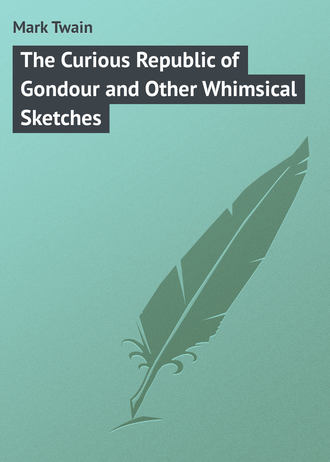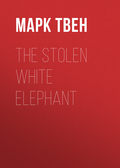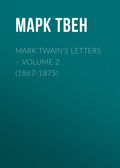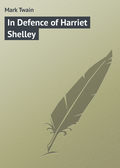
Марк Твен
The Curious Republic of Gondour and Other Whimsical Sketches
The Tone-Imparting Committee
I get old and ponderously respectable, only one thing will be able to make me truly happy, and that will be to be put on the Venerable Tone-Imparting committee of the city of New York, and have nothing to do but sit on the platform, solemn and imposing, along with Peter Cooper, Horace Greeley, etc., etc., and shed momentary fame at second hand on obscure lecturers, draw public attention to lectures which would otherwise clack eloquently to sounding emptiness, and subdue audiences into respectful hearing of all sorts of unpopular and outlandish dogmas and isms. That is what I desire for the cheer and gratification of my gray hairs. Let me but sit up there with those fine relics of the Old Red Sandstone Period and give Tone to an intellectual entertainment twice a week, and be so reported, and my happiness will be complete. Those men have been my envy for long, long time. And no memories of my life are so pleasant as my reminiscence of their long and honorable career in the Tone-imparting service. I can recollect that first time I ever saw them on the platforms just as well as I can remember the events of yesterday. Horace Greeley sat on the right, Peter Cooper on the left, and Thomas Jefferson, Red Jacket, Benjamin Franklin, and John Hancock sat between them. This was on the 22d of December, 1799, on the occasion of the state’ funeral of George Washington in New York. It was a great day, that – a great day, and a very, very sad one. I remember that Broadway was one mass of black crape from Castle Garden nearly up to where the City Hall now stands. The next time I saw these gentlemen officiate was at a ball given for the purpose of procuring money and medicines for the sick and wounded soldiers and sailors. Horace Greeley occupied one side of the platform on which the musicians were exalted, and Peter Cooper the other. There were other Tone-imparters attendant upon the two chiefs, but I have forgotten their names now. Horace Greeley, gray-haired and beaming, was in sailor costume – white duck pants, blue shirt, open at the breast, large neckerchief, loose as an ox-bow, and tied with a jaunty sailor knot, broad turnover collar with star in the corner, shiny black little tarpaulin hat roosting daintily far back on head, and flying two gallant long ribbons. Slippers on ample feet, round spectacles on benignant nose, and pitchfork in hand, completed Mr. Greeley, and made him, in my boyish admiration, every inch a sailor, and worthy to be the honored great-grandfather of the Neptune he was so ingeniously representing. I shall never forget him. Mr. Cooper was dressed as a general of militia, and was dismally and oppressively warlike. I neglected to remark, in the proper place, that the soldiers and sailors in whose aid the ball was given had just been sent in from Boston – this was during the war of 1812. At the grand national reception of Lafayette, in 1824, Horace Greeley sat on the right and Peter Cooper to the left. The other Tone-imparters of the day are sleeping the sleep of the just now. I was in the audience when Horace Greeley Peter Cooper, and other chief citizens imparted tone to the great meetings in favor of French liberty, in 1848. Then I never saw them any more until here lately; but now that I am living tolerably near the city, I run down every time I see it announced that “Horace Greeley, Peter Cooper, and several other distinguished citizens will occupy seats on the platform;” and next morning, when I read in the first paragraph of the phonographic report that “Horace Greeley, Peter Cooper, and several other distinguished citizens occupied seats on the platform,” I say to myself, “Thank God, I was present.” Thus I have been enabled to see these substantial old friends of mine sit on the platform and give tone to lectures on anatomy, and lectures on agriculture, and lectures on stirpiculture, and lectures on astronomy, on chemistry, on miscegenation, on “Is Man Descended from the Kangaroo?” on veterinary matters, on all kinds of religion, and several kinds of politics; and have seen them give tone and grandeur to the Four-legged Girl, the Siamese Twins, the Great Egyptian Sword Swallower, and the Old Original Jacobs. Whenever somebody is to lecture on a subject not of general interest, I know that my venerated Remains of the Old Red Sandstone Period will be on the platform; whenever a lecturer is to appear whom nobody has heard of before, nor will be likely to seek to see, I know that the real benevolence of my old friends will be taken advantage of, and that they will be on the platform (and in the bills) as an advertisement; and whenever any new and obnoxious deviltry in philosophy, morals, or politics is to be sprung upon the people, I know perfectly well that these intrepid old heroes will be on the platform too, in the interest of full and free discussion, and to crush down all narrower and less generous souls with the solid dead weight of their awful respectability. And let us all remember that while these inveterate and imperishable presiders (if you please) appear on the platform every night in the year as regularly as the volunteered piano from Steinway’s or Chickering’s, and have bolstered up and given tone to a deal of questionable merit and obscure emptiness in their time, they have also diversified this inconsequential service by occasional powerful uplifting and upholding of great progressive ideas which smaller men feared to meddle with or countenance.
Goldsmith’s Friend Abroad Again
Letter I
Shanghai, 18—.
Dear Ching-Foo: It is all settled, and I am to leave my oppressed and overburdened native land and cross the sea to that noble realm where all are free and all equal, and none reviled or abused – America! America, whose precious privilege it is to call herself the Land of the Free and the Home of the Brave. We and all that are about us here look over the waves longingly, contrasting the privations of this our birthplace with the opulent comfort of that happy refuge. We know how America has welcomed the Germans and the Frenchmen and the stricken and sorrowing Irish, and we know how she has given them bread and work and liberty, and how grateful they are. And we know that America stands ready to welcome all other oppressed peoples and offer her abundance to all that come, without asking what their nationality is, or their creed or color. And, without being told it, we know that the foreign sufferers she has rescued from oppression and starvation are the most eager of her children to welcome us, because, having suffered themselves, they know what suffering is, and having been generously succored, they long to be generous to other unfortunates and thus show that magnanimity is not wasted upon them.
Ah Song Hi.
Letter II
At Sea, 18—.
Dear Ching-Foo: We are far away at sea now, on our way to the beautiful Land of the Free and Home of the Brave. We shall soon be where all men are alike, and where sorrow is not known.
I thought I would have twelve dollars to begin life with in America, but the American Consul took two of them for making a certificate that I was shipped on the steamer. He has no right to do more than charge the ship two dollars for one certificate for the ship, with the number of her Chinese passengers set down in it; but he chooses to force a certificate upon each and every Chinaman and put the two dollars in his pocket. As 1,300 of my countrymen are in this vessel, the Consul received $2,600 for certificates. My employer tells me that the Government at Washington know of this fraud, and are so bitterly opposed to the existence of such a wrong that they tried hard to have the extor the fee, I mean, legalised by the last Congress;[3] but as the bill did not pass, the Consul will have to take the fee dishonestly until next Congress makes it legitimate. It is a great and good and noble country, and hates all forms of vice and chicanery.
We are in that part of the vessel always reserved for my countrymen. It is called the steerage. It is kept for us, my employer says, because it is not subject to changes of temperature and dangerous drafts of air. It is only another instance of the loving unselfishness of the Americans for all unfortunate foreigners. The steerage is a little crowded, and rather warm and close, but no doubt it is best for us that it should be so.
Yesterday our people got to quarrelling among themselves, and the captain turned a volume of hot steam upon a mass of them and scalded eighty or ninety of them more or less severely. Flakes and ribbons of skin came off some of them. There was wild shrieking and struggling while the vapour enveloped the great throng, and so some who were not scalded got trampled upon and hurt. We do not complain, for my employer says this is the usual way of quieting disturbances on board the ship, and that it is done in the cabins among the Americans every day or two.
Congratulate me, Ching-Foo! In ten days more I shall step upon the shore of America, and be received by her great-hearted people; and I shall straighten myself up and feel that I am a free man among freemen.
Ah Song Hi.
Letter III
San Francisco, 18—.
Ah Song Hi.
Letter VI
San Francisco, 18—.
Dear Ching-Foo: I have been here about a month now, and am learning a little of the language every day. My employer was disappointed in the matter of hiring us out to service on the plantations in the far eastern portion of this continent. His enterprise was a failure, and so he set us all free, merely taking measures to secure to himself the repayment of the passage money which he paid for us. We are to make this good to him out of the first moneys we earn here. He says it is sixty dollars apiece.
We were thus set free about two weeks after we reached here. We had been massed together in some small houses up to that time, waiting. I walked forth to seek my fortune. I was to begin life a stranger in a strange land, without a friend, or a penny, or any clothes but those I had on my back. I had not any advantage on my side in the world – not one, except good health and the lack of any necessity to waste any time or anxiety on the watching of my baggage. No, I forget. I reflected that I had one prodigious advantage over paupers in other lands – I was in America! I was in the heaven-provided refuge of the oppressed and the forsaken!
“This Ching divil comes till Ameriky to take the bread out o’ dacent intilligent white men’s mouths, and whin they try to defind their rights there’s a dale o’ fuss made about it.”
They began to threaten my benefactor, and as he saw no friendliness in the faces that had gathered meanwhile, he went on his way. He got many a curse when he was gone. The policemen полу told me I was under arrest and must go with them. I asked one of them what wrong I had done to any one that I should be arrested, and he only struck me with his club and ordered me to “hold my yap.” With a jeering crowd of street boys and loafers at my heels, I was taken up an alley and into a stone– paved dungeon which had large cells all down one side of it, with iron gates to them. I stood up by a desk while a man behind it wrote down certain things about me on a slate. One of my captors said:
“Enter a charge against this Chinaman of being disorderly and disturbing the peace.”
I attempted to say a word, but he said:
“Silence! Now ye had better go slow, my good fellow. This is two or three times you’ve tried to get off some of your d – d insolence. Lip won’t do here. You’ve got to simmer down, and if you don’t take to it paceable we’ll see if we can’t make you. Fat’s your name?”
“Ah Song Hi.”
“Alias what?.”
I said I did not understand, and he said what he wanted was my true name, for he guessed I picked up this one since I stole my last chickens. They all laughed loudly at that.
“Now look here, Johnny, it’s no use you playing softly wid us. We mane business, ye know; and the sooner ye put us on the scent of a V, the asier ve’ll save yerself from a dale of trouble. Ye can’t get out o’ this for anny less. Who’s your frinds?”
I told him I had not a single friend in all the land of America, and that I was far from home and help, and very poor. And I begged him to let me go.
He gathered the slack of my blouse collar in his grip and jerked and shoved and hauled at me across the dungeon, and then unlocking an iron cell-gate thrust me in with a kick and said:
“Hot there, ye furrin spawn, till ye lairn that there’s no room in America for the likes of ye or your nation.”
Ah Song Hi.
Letter V
San Francisco, 18—.
Dear Ching-Foo: You will remember that I had just been thrust violently into a cell in the city prison when I wrote last. I stumbled and fell on some one. I got a blow and a curse; and on top of these a kick or two and a shove. In a second or two it was plain that I was in a nest of prisoners and was being “passed around”—for the instant I was knocked out of the way of one I fell on the head or heels of another and was promptly ejected, only to land on a third prisoner and get a new contribution of kicks and curses and a new destination. I brought up at last in an unoccupied corner, very much battered and bruised and sore, but glad enough to be let alone for a little while. I was on the flag-stones, for there was no furniture in the den except a long, broad board, or combination of boards, like a barn door, and this bed was accommodating five or six persons, and that was its full capacity. They lay stretched side by side, snoring – when not fighting. One end of the board was four inches higher than the other, and so the slant answered for a pillow. There were no blankets, and the night was a little chilly; the nights are always a little chilly in San Francisco, though never severely cold. The board was a deal more comfortable than the stones, and occasionally some flag-stone plebeian like me would try to creep to a place on it; and then the aristocrats would hammer him good and make him think a flag pavement was a nice enough place after all.
I lay quiet in my corner, stroking my bruises and listening to the revelations the prisoners made to each other – and to me – for some that were near me talked to me a good deal. I had long had an idea that Americans, being free, had no need of prisons, which are a contrivance of despots for keeping restless patriots out of mischief. So I was considerably surprised to find out my mistake.
Ah Song Hi.
Letter VI
San Francisco, 18—.
Another of our company was a boy of fourteen who had been watched for some time by officers and teachers, and repeatedly detected in enticing young girls from the public schools to the lodgings of gentlemen down town. He had been furnished with lures in the form of pictures and books of a peculiar kind, and these he had distributed among his clients. There were likenesses of fifteen of these young girls on exhibition (only to prominent citizens and persons in authority, it was said, though most people came to get a sight) at the police headquarters, but no punishment at all was to be inflicted on the poor little misses. The boy was afterward sent into captivity at the House of Correction for some months, and there was a strong disposition to punish the gentlemen who had employed the boy to entice the girls, but as that could not be done without making public the names of those gentlemen and thus injuring them socially, the idea was finally given up.
There was also in our cell that night a photographer (a kind of artist who makes likenesses of people with a machine), who had been for some time patching the pictured heads of well-known and respectable young ladies to the nude, pictured bodies of another class of women; then from this patched creation he would make photographs and sell them privately at high prices to rowdies and blackguards, averring that these, the best young ladies of the city, had hired him to take their likenesses in that unclad condition. What a lecture the police judge read that photographer when he was convicted! He told him his crime was little less than an outrage. He abused that photographer till he almost made him sink through the floor, and then he fined him a hundred dollars. And he told him he might consider himself lucky that he didn’t fine him a hundred and twenty-five dollars. They are awfully severe on crime here.
And in a few seconds he sank down again and grew flighty of speech. One of our people was «at last penetrated with something vaguely akin to compassion, may be, for he looked out through the gratings at the guardian officer pacing to and fro, and said:
“Say, Mickey, this shrimp’s goin’ to die.” “Stop your noise!” was all the answer he got. But presently our man tried it again. He drew himself to the gratings, grasping them with his hands, and looking out through them, sat waiting till the officer was passing once more, and then said:
“Sweetness, you’d better mind your eye, now, because you beats have killed this cuss. You’ve busted his head and he’ll pass in his checks before sun-up. You better go for a doctor, now, you bet you had.”
The officer delivered a sudden rap on our man’s knuckles with his club, that sent him scampering and howling among the sleeping forms on the Hag-stones, and an answering burst of laughter came from the half dozen policemen idling about the railed desk in the middle of the dungeon.
But there was a putting of heads together out there presently, and a conversing in low voices, which seemed to show' that our man’s talk had made an impression; and presently an officer went away in a hurry, and shortly came back with a person who entered our cell and felt the bruised man’s pulse and threw' the glare of a lantern on his drawn face, striped with blood, and his glassy eyes, fixed and vacant. The doctor examined the man’s broken head also, and presently said:
“If you’d called me an hour ago I might have saved this man, may be – too late now.” Then he walked out into the dungeon and the officers surrounded him, and they kept up a low and earnest buzzing of conversation for fifteen minutes, I should think, and then the doctor took his departure from the prison. Several of the officers now came in and worked a little with the wounded man, but toward daylight he died.
By and by all the animals in all the cages awoke, and stretched themselves, and exchanged a few cuff's and curses, and then began to clamour for breakfast. Breakfast was brought in at last – bread and beefsteak on tin plates, and black coffee in tin cups, and no grabbing allowed. And after several dreary hours of waiting, after this, we were all marched out into the dungeon and joined there by all manner of vagrants and vagabonds, of all shades and colours and nationalities, from the other cells and cages of the place; and pretty soon our whole menagerie was marched up-stairs and locked fast behind a high railing in a dirty room with a dirty audience in it. And this audience stared at us, and at a man seated on high behind what they call a pulpit in this country, and at some clerks and other officials seated below him – and waited. This was the police court.
And I grew still more uneasy, when I found that any succored and befriended refugee from Ireland or elsewhere could stand up before that judge and swear away the life or liberty or character of a refugee from China; but that by the law of the land the Chinaman could not testify against the Irishman. I was really and truly uneasy, but still my faith in the universal liberty that America accords and defends, and my deep veneration for the land that offered all distressed outcasts a home and protection, was strong within me, and I said to myself that it would all come out right yet.
Ah Song Hi.
Letter VII
San Francisco, 18—.
Dear Chinq Foo: I was glad enough when my case came up. An hour’s experience had made me as tired of the police court as of the dungeon. I was not uneasy about the result of the trial, but on the contrary felt that as soon as the large auditory of Americans present should hear how that the rowdies had set the dogs on me when I was going peacefully along the street, and how, when I was all torn and bleeding, the officers arrested me and put me in jail and let the rowdies go free, the gallant hatred of oppression which is part of the very flesh and blood of every American would be stirred to its utmost, and I should be instantly set at liberty. In truth I began to fear for the other side. There in full view stood the ruffians who had misused me, and I began to fear that in the first burst of generous anger occasioned by the revealment of what they had done, they might be harshly handled, and possibly even banished the country as having dishonoured her and being no longer worthy to remain upon her sacred soil.






